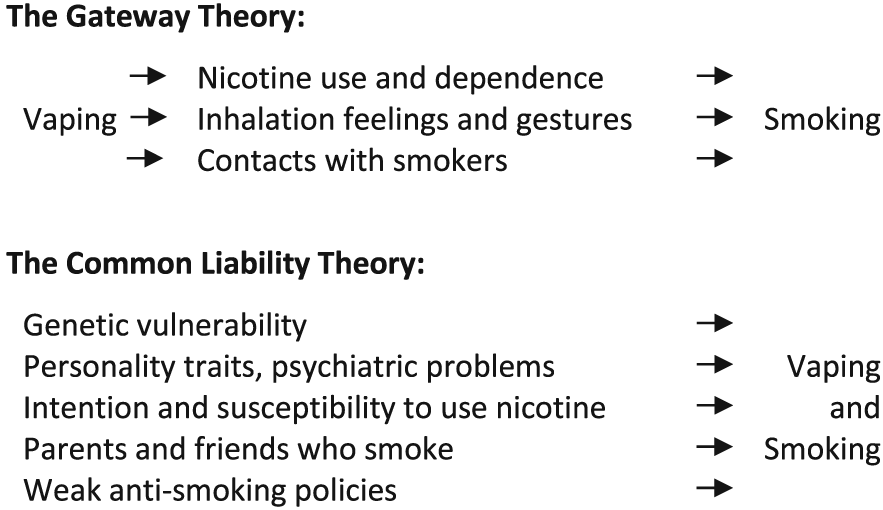November 24, 2017
Last August (2017), the journal addiction published a paper by Jean François Etter, “Gateway effects and electronic cigarettes,” that tried to dismiss the very strong and consistent evidence that adolescents who initiate tobacco product use with e-cigarettes are more likely to go on to smoke cigarettes, the so-called “gateway effect.”
Much like past tobacco industry efforts to use the Bradford Hill criterial for causal inference to dismiss the evidence linking smoking with lung cancer, Etter came up with something analogous to the industry’s old “constitutional hypothesis” that argued that smokers got lung cancer because there was some genetic factor that both increased the risk of lung cancer can made it more likely that someone would start smoking. Figure 1 in his paper sums up his position:
November 22, 2017
My colleagues at UCSF just submitted this public comment to FDA on Philip Morris' IQOS MRTP application. The tracking number is 1k1-8zy0-6rfg. A PDF version of the comment is available here.
Philip Morris’s Population Health Impact Model Based on Questionable Assumptions and Insufficient Health Impact Measures Does Not Adequately Support its MRTP Application
Wendy Max, PhD, Lauren Lempert, JD, Hai-Yen Sung, PhD, James Lightwood, PhD, Yingning Wang, PhD, and Tingting Yao, PhD
UCSF TCORS
Docket Number: FDA-2017-D-3001
November 22, 2017
November 21, 2017
The way that the FDA is rushing this application is really short-circuting effecting public participation in reviewing the IQOS application. And they are not giving their Tobacco Products Scientific Advisory Committee anywhere near enough time to provide a thoughtful analysis on the application.
Here is the health groups' letter to FDA (PDF).
November 21, 2017
Mr. Mitchell Zeller
Director, Center for Tobacco Products
Food and Drug Administration
10903 New Hampshire Avenue
Silver Spring, MD
Re: Docket No. FDA-2017-D-3001
Dear Director Zeller:
This letter renews the October 11, 2017 request made by the undersigned organizations, that FDA extend the deadline for submission of comments in the above-designated docket until six months following the publication of the final installment of the application and requests a similar postponement for the submission of public comments to the Tobacco Products Scientific Advisory Committee (TPSAC). We reiterate our request.
November 21, 2017
Matthew Springer, Bonnie Halpern-Felsher and I just published “Marijuana, Secondhand Smoke, and Social Acceptability” in JAMA Internal Medicine.
Here are the first couple paragraphs:
On April 20, 2017, at 4:20 in the afternoon, 15 000 people in San Francisco’s Golden Gate Park lit marijuana joints during the annual “420 Day.” In cannabis culture, April 20 has become an international countercultural holiday; people gather to celebrate and consume cannabis, typically around 4:20 pm.
The giant cloud of secondhand marijuana smoke was visible from the University of California, San Francisco, half a mile away. The cloud embodied the revelers’ new freedom on this first 420 Day since California voters legalized recreational marijuana in November 2016. The smoke cloud, however, was also part of a growing source of air pollution. ….
You can read the whole thing for free here.
November 21, 2017
Matthew Springer and his colleagues at UCSF have submitted this public comment to the FDA. The tracking number is 1k1-8zxa-mq9v and a PDF of the comment is available here.
The evidence PMI presents in its MRTP application for IQOS is misleading and does not support the conclusion that IQOS will not harm endothelial function; independent research done in a more relevant physiological model shows that IQOS harms endothelial function as much as conventional cigarettes
Matthew L. Springer, Ph.D., Pooneh Nabavizadeh, M.D., and Leila Mohammadi, M.D., Ph.D. Department of Medicine, Division of Cardiology
Cardiovascular Research Institute
UCSF Tobacco Center of Regulatory Science
University of California, San Francisco
Docket Number: FDA-2017-D-3001
November 20, 2017
